A version of this post was originally distributed in Votebeat’s free weekly newsletter. Sign up to get it delivered to your inbox every Saturday.
A lot of ink has been spilled this week pointing out the differences and similarities between the two sets of indictments that former President Donald Trump faces for his efforts to subvert the 2020 election.
Special counsel Jack Smith’s federal case is highly narrative. He is creatively interpreting older law to apply to completely unprecedented behavior from a public official in the United States, requiring storytelling and chronological framing to explain the applicability of the laws. Fulton County District Attorney Fani Willis’s charges in Georgia — though vast in number and diverse in scope — have far less of that and don’t really require it. The crimes described by Willis, or at least most of them, are simply more straightforward than the crimes described by Smith.
And part of the reason for that relative simplicity is that elections are local and governed by local law. The offices that carry out elections are county and state offices, and the officials who can most meaningfully be influenced to violate their legally required duties are county and state officials. There are more applicable crimes in this space because there are more applicable laws in this space.
While there are big, nationally known names among the defendants — Mark Meadows, Rudy Giuliani, Sidney Powell, and John Eastman — there are a lot of them you’ve probably never heard of. They include locals like Georgia Republican Party Chair David Shafer, Republican State Sen. Shawn Still, and Coffee County Elections Supervisor Misty Hampton. The criminal acts alleged in the document span everything from impersonating a public official to racketeering to computer theft.
For example, Willis’s case lays out how local actors worked alongside the former president to tamper with and illegally access voting equipment in the state. Despite an investigation by the Georgia Bureau of Investigations, none of the well-known suspects in the case had been charged until Monday.
This week, Lawfare put out an astounding deep dive into the events in Coffee County. It shows how local these issues really are, reconstructing the actions of local party officials and local elected officials, drilling down into the things we’re all so familiar with: meeting minutes, misinformation in local activists’ YouTube videos, public records.
The Georgia case also, finally, attempts to achieve some justice for election workers Ruby Freeman and Shaye Moss, who were relentlessly harassed as a result of the lies described in the filing. While the pair have sued Giuliani for defamation, the indictments finally hold others accountable for their actions facilitating or carrying out the shocking treatment of these women.
It also explains the organization of the fake elector scheme carried out in the state, and explains in great detail the lengths that campaign officials went to alongside local GOP staff and party members to submit a slate of false electors to Congress claiming Trump had won the 2020 election in Georgia.
And Willis’s choice to pursue this case using RICO charges has allowed her to more clearly tie together the actions of Trump to his campaign officials and to state and local officials in Georgia, all as parts of one criminal enterprise, in the eyes of Georgia’s powerful racketeering law. None of the other cases Trump has so far faced have been able to draw such clear lines.
Still, Willis’s case is likely to face huge hurdles.
The individuals charged who were employees of the federal government at the time the alleged crimes were committed can ask for the case to be moved to federal court. Mark Meadows already has, and a hearing has been scheduled for Aug. 28. Trump and former Justice Department Official Jeffery Clark will almost certainly make the same move.
Willis is expected to fight back, but those hearings and those decisions take time. As do lots of other things well before the trial begins.
Jury selection is one of those time-consuming phases. To wit, Willis is also trying a RICO case against rapper Young Thug and nine other defendants. Jury selection for the case began in January and has taken eight months, the longest jury selection has ever taken in Georgia. Trump’s case is far more complicated and has twice the number of defendants, which increases the number of potential conflicts among the jury pool.
As in the Young Thug case, the wait and expense of attorneys is likely to mean that defendants begin dropping and turning against each other. But it’s also likely to mean that we are waiting years for Willis’s case to wrap itself up. I recommend this episode of the Serious Trouble podcast for a smart discussion of this hurdle and others.
Still, if it’s successful, Willis’s case will be profoundly important as a precedent-setting measure. Lots of you have told me that you fear that the treatment of election workers and the dirty tricks the political parties play in elections will get worse, not better, over time. It’s a concern I share.
Convictions in the Georgia case might mean real change in this regard. Her extensive use of local-level law to hold local individuals accountable for behavior that had national consequences has the potential to make a difference in the future, even in non-presidential elections. Its ability to deter similar behavior in the future is an important outcome entirely outside the reach of Jack Smith’s prosecution of the former president.
Back Then
Here’s a fun one that reinforces the importance of the availability of absentee ballots: In 1898, Thomas C. Dawson, first secretary of the United States legation at Rio Janeiro, traveled a whopping 8,000 miles from where he was stationed in Brazil to his home in Council Bluffs, Iowa, to cast a ballot. Reads the New York Times, “Mr. Dawson, although a comparatively young man, is a political factor in Iowa.”
New From Votebeat
From Votebeat Pennsylvania: Pa. will track voting machine malfunctions under new settlement with election security groups
From Votebeat Texas: New law extending early-voting hours could cause poll worker shortage in rural Texas
From Votebeat Michigan: Michigan clerk faces demands for resignation and recall threats after his indictment in “false elector” plot
From Votebeat Arizona: Rulebook for Arizona’s 2024 elections faces criticism from multiple sides
From Votebeat Texas: Harris County’s election chief remains in legal limbo after judge rules that lawmakers can’t dissolve the position
In Other Voting News
Authorities are investigating threats made to members of the grand jury in Georgia that recently indicted Trump and 18 others after their names were included in the indictment.
The new elections director in Coffee County, Georgia, has a big job ahead of her, and in advance of the 2024 election she met with local media to promise transparency given the recent charges.
NBC News has published an inside look at one of the GOP’s favorite proposed replacements for the Electronic Registration Information Center — a newer program that checks rolls for ineligible voters called Eagle AI. Preview: It relies on far less data and doesn’t work nearly as well.
Trump ally and My Pillow CEO Mike Lindell gathered voting activists in Springfield, Missouri, to outline what he described as a God-sent plan to save America. The Springfield News-Leader attended so you didn’t have to, and here’s how it went.
Ahead of the 2024 elections, the Democratic Association of Secretaries of State is planning a $10 million program to hire private security to protect election officials. The venture, called Value the Vote, will focus on five states: Georgia, Arizona, North Carolina, Nevada, and Wisconsin.
An appeals court in Indiana has shut down a legal attempt to expand vote-by-mail eligibility, filed by voters who initially qualified to vote by mail under pandemic rules but could not do so in 2022. Meanwhile, Roll Call is out with a piece on why Utah Republicans buck their national counterparts in embracing the practice.
Republicans in North Carolina have proposed sweeping changes to the state’s election laws ahead of next year’s presidential elections. WUNC has an explainer.
Spalding County, Georgia, south of Atlanta, has approved a measure to hand-count ballots to check the accuracy of the machine counts before results can be certified. Hand counting, as ever, remains a risky and inefficient way to tally votes.
Jessica Huseman is Votebeat’s editorial director and is based in Dallas. Contact Jessica at jhuseman@votebeat.org.






